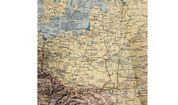Americans have always thought in terms of geography: The Purchase of Louisiana

The Mississippi river (photo: Pixabay)
But the influence if geography is so imposing and its significance so evident that even the most idealistic leaders must succumb to its influence if they want to make viable and sustainable decisions. This kind of influence of geopolitics on idealism is also visible in the history of the United States, a country considered (not quite reasonably) by wide public to be founded primarily on “principles” as opposed to “realism,” especially a realism based on geopolitics.
A TROUBLESOME BORDER
There was no greater idealist among American Founding Fathers than the third US president – Thomas Jefferson. It was none other than Thomas Jefferson who was the author of the American Declaration of Independence, a document containing the credo of Enlightenment liberalism and faith in human capabilities. At this point, of course, we’re talking about Thomas Jefferson’s approach to public life, because in private life it varied (Jefferson, believing in equality and freedom of all people, was the owner of slaves, for example).
It was also Thomas Jefferson who, after becoming president, eagerly dismantled the state machine created by the first two presidents, George Washington and John Adams, as well as the treasury secretary Alexander Hamilton – a machine that was meant to create a modern European-like power out of the United States. Jefferson instead was a sincere follower of the idea of a minimal state.
A break in Jefferson’s idealism, however, was caused by Louisiana, a territory covering an area many times larger than the modern state of the same name.
Louisiana at that time was an area stretching from the Mississippi River in the east to the Rocky Mountains in the West. In the south, from the Gulf of Mexico to the Great Lakes in the north, the current border with Canada. Two large rivers flowed through the territory: the Missouri, which then flows into the Mississippi, which in turn flows further south to the Gulf of Mexico.
At that time, New Orleans was the main city of this territory, an important commercial port located on the Gulf of Mexico, near the mouth of the Mississippi. It was here that much of America’s trade was floated. A special Congress report from January 1803 indicated that for the entire (then) western United States, New Orleans was the only point from which goods could be shipped, whether abroad, or through the Gulf of Mexico and around Florida to US ports in the Atlantic (transport by river and sea was easier than the overland routes on the east-west line).
It was on the Mississippi River that the western border of the United States after the War of Independence ended, determined in accordance with the provisions of the Paris Treaty of 1783. At the same time, New Orleans was outside this boundary.
Originally, Louisiana belonged to France (hence its name derived from the name of the French sun king Louis XIV). After the Seven Years War, it passed into the hands of Spain. As a result of the Napoleonic wars, it was in France’s hands again in 1801.
AN IDEALIST PRESIDENT AND A CUNNING FRENCH MINISTER
At that time, the American administration headed by Thomas Jefferson was rather positive about the French. Firstly, this resulted from the gratitude of the Americans for the help they had received from monarchical France during the War of Independence. Secondly, the Americans considered the French Revolution to be an implementation of the same principles that gave rise to the American Revolution. But when Louisiana and New Orleans passed from Spanish to French hands, a glance at the map raised Jefferson’s fears. During his annual address to Congress, Jefferson said in 1802: “The assignment of the Spanish province of Louisiana to France … will change […] our foreign relations.”
The president’s contemporaries knew what he was alluding to (one of the congressmen, Thomas Lowndes, even pointed out that this would have been obvious to every “schoolboy”). But from our perspective, what exactly Jefferson had in mind here can be learned from his letter to the American ambassador to France – Robert Livingstone – from April 18, 1802.
As Jefferson explained: “There is on the globe one single spot, the possessor of which is our natural & habitual enemy. it is New Orleans, through which the produce of three eighths of our territory must pass to market, […] France placing herself in that door assumes to us the attitude of defiance.”
Suddenly, however, in the same year that Jefferson was sharing his concerns with Congress, France (ruled by first consul Napoleon Bonaparte) through the minister Maurice Talleyrand proposed to the United States the purchase of Louisiana. Jefferson had conflicting emotions. He believed that such an idea was not feasible from a constitutional point of view. The new US constitution did not provide for the federal government’s authority to acquire new territories, and Jefferson was reluctant to expand the powers of the central authorities.
JEFFERSON BUYS LOUISIANA
In the end, however, Jefferson had to bend under the pressure of the logic map of the distribution of points of strength, resources and vital communication routes for the young American state. To maintain the idealist’s procedures and purity of conscience, Jefferson proposed a constitutional amendment retroactively allowing the purchase of Louisiana, but Congress found it superfluous.
It is worth briefly following the considerations that prompted Jefferson to buy Louisiana. As I noted earlier, despite Jefferson’s positive attitude towards revolutionary France, he pointed out that whoever owns New Orleans is America’s “natural” enemy. Jefferson assumed that France may want to take advantage of the possibility of influencing American trade to such an extent in the United States (for example, the imposition of customs duties or the closure of the port in New Orleans).
Further, in a letter to General Horatio Gates of July 11, 1803, Jefferson praised the acquisition of Missouri and Mississippi, fertile farming land, raw materials, and “important communications”. To this day, these are important arable lands for the United States.
In turn, in a letter to John Dickinson (one of the other Founding Fathers) of August 9, 1803, Jefferson points to one more important issue that will become symptomatic of the entire US foreign policy in the nineteenth century – the tendency to ‘simplify the map’.
Jefferson explained that the takeover of Louisiana from France meant that this European power ceased to be a neighbor of the USA along the entire length of the western border. This meant that “it excludes those bickerings with foreign powers which we know of a certainty would have put us at war with France immediately.” In 1805, in a speech to Congress, Jefferson asked rhetorically: “is it not better that the opposite bank of the Mississippi should be settled by our own brethren and children, than by strangers of another family?”
Of course, there was also the “British issue” on the table. The Americans, not without reason, assumed that Great Britain, as the dominant naval power, might easily want to pull Louisiana out of the hands of the Spanish or the French.
Despite their land forces, these powers would not be able to move troops across the Atlantic to maintain Louisiana – precisely because of England’s maritime domination. This had already been pointed out, for example, by James Madison (the main creator of the American constitution and secretary of state in the Jefferson administration) in a letter of July 24, 1801, indicating in this way that the United States would be flanked from the west by England.
Madison was right: a dozen or so years later, in one of the last chords of the Napoleonic Wars, Great Britain actually attacked the United States from the south in order to occupy Louisiana. It was then that the battle of New Orleans was fought, a victorious clash for the Americans, which took the presidency to General Andrew Jackson.
Jefferson summed up all of these issues in a speech to Congress at the end of the third year of his term: “While the property and sovereignty of the Mississippi and its waters secure an independent outlet for the produce of the western States, and an uncontrolled navigation through their whole course, free from collision with other powers and the dangers to our peace from that source, the fertility of the country, its climate and extent, promise in due season important aids to our Treasury, an ample provision for our posterity, and a wide-spread field for the blessings of freedom and equal laws.”
It’s worth taking a closer look at this last sentence, which tells us that Jefferson treated the Louisiana Purchase as necessary not only because of the strategic interests of the United States but because he also believed that he had obtained enough land on which to grow a society of independent farmers, a kind of eighteenth-century middle class; ideal citizens for the republic.
In order not to stop at the views of Jefferson himself, we should consider the views of some of the other representatives of American political life who shared the president’s assessment and were from the opposite political camp. This shows that geopolitics can operate beyond divisions.
Firstly, Alexander Hamilton, treasury secretary in the George Washington administration, a man who was the brains of the opposition Federalist Party. Despite the fact that Jefferson removed him from power and both men were sworn enemies, Hamilton still appreciated the importance of buying Louisiana. In an article for the New York Evening Post of July 5, 1803, Hamilton admitted that “this western area is important as keeping off a troublesome neighbor, and leaving us in the quiet possession of the Mississippi” but also that “whoever is in possession of [New Orleans] has uncontrolled command of the river.” And further: “New Orleans, by which the command of a free navigation of the Mississippi is secured, … gives to this interesting cession, its greatest value, […] By this cession we hereafter shall hold within our grasp, what we have heretofore enjoyed only by the uncertain tenure of a treaty [with, for example, Spain], which might be broken at the pleasure of another.”
Many years later, in a letter of February 8, 1811, the second American president John Adams (also an important figure among Jefferson’s opponents) explained that: “I was pleased with the purchase of Louisiana, because without it we could never have secured and guided the navigation of the Mississippi.”
Indeed, the American opposition was not uniform here, various arguments were raised regarding Louisiana’s purchase (including the concern about Jefferson’s lack of a constitutional basis for such a step), but it is important that the most important figures of American political life thought in a similar way about the benefits of acquiring new territory.
THE LESSON OF AMERICAN HISTORY
An important lesson, once articulated by Theodore Roosevelt, springs from the history of the United States: professing noble ideas does not release you from the obligation to think in terms of strength and realism. On the contrary, in order to stay alive a country organized according to such ideas as the United States must be strong. In order to be strong, it must correctly identify sources of this force located in space, as well as control them.
Autor
Kuba Gąsiorowski
Holds Ph.D. in law, an expert in the field of the history of American political and legal thought, author of "The American Project". Alumnus of the Fulbright Scholarship in Washington D.C. His articles were published by the Jagiellonian Club, New Confederation and Rzeczpospolita Daily. He is an attorney working in international trade. Short-listed for the "Rising Stars 2019" Award by "Legal Newspaper Daily" and Wolters Kluwer publishing house.






Trwa ładowanie...